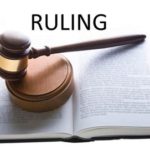BAD RULING. Male Sues Over Expulsion For Alleged TitleIX Violation. Will Not Be Reinstated
A student suing the University after he was expelled earlier this term over Title IX violations will not be able to finish the academic year, a federal court ruled. John Doe, sued the University on April 15, asserting that Princeton had violated Title IX, by expelling him for alleged violations of the University’s “Intimate Partner Violence” policy. On the same day, Doe filed a motion for a temporary restraining order (TRO). The TRO sought to prevent the University from enforcing, while Doe’s lawsuit is pending, its decisions to expel him and prohibit him from attending class and sitting for exams. In an opinion published on April 21, Judge Brian Martinotti agreed with the University, ruling that Doe is unlikely to succeed in his claims against Princeton.
According to the opinion, the lawsuit arose after Princeton’s Title IX Office investigated allegations of intimate partner violence brought against Doe by his ex-girlfriend, Jane Roe. In his ruling, Martinotti rejected Doe’s argument that the University had likely been motivated by gender bias. The judge ruled that Doe’s “conclusory allegations of gender bias” did not include “specific instances of gender bias” such as “statements by members of the disciplinary tribunal, statements by pertinent university officials,” or “patterns of decision-making that also tend to show the influence of gender.”
Instead, the court concluded that Doe had attempted to demonstrate gender bias by “pointing to the alleged disparate treatment he and Jane received throughout the investigation” and “the fact that Jane was given credibility for her version of the events while he was not.” But Doe’s allegations fell short because they did not claim that Jane’s gender was the basis for these differences, the court ruled. The court also rejected Doe’s arguments that Princeton was holding men to a different standard than women. Martinotti explained that to successfully make such a claim, a “male plaintiff must demonstrate that a female was in circumstances sufficiently similar to his own and was treated more favorably by the university.”
The Court also concluded that Doe would not suffer irreparable harms — an element of the high legal standard required of a plaintiff seeking a temporary injunction — as a result of his expulsion remaining in place while his suit against the University proceeds. Doe’s legal team asked the Court to “provisionally reinstate” him by allowing him to watch recorded classes, sit for spring exams, and have those exams graded and sealed, to be opened should he prevail in his suit. But the court rejected this request, too, ruling that because Doe’s claims will likely take months to completely resolve, he would still suffer the harm—a gap in his resume—whether or not he is provisionally reinstated. Yet, according to an April 21 letter to the judge by Princeton’s counsel, the University confirmed it is able “to take steps” to preserve existing and future recordings of John Doe’s lectures from this semester “for the pendency of this litigation.” As a result of the ruling, Doe’s expulsion will remain in place as he litigates his claims against the University.
dailyprincetonian-Sheinerman

